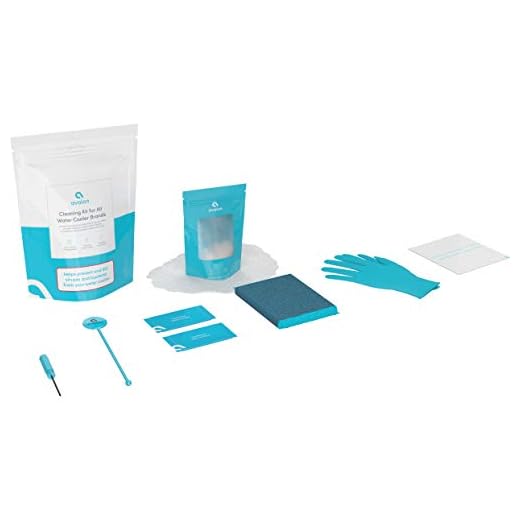




Step-by-Step Cleaning Process
Begin by turning off the water supply to the filter system. Disconnect the filter from its housing, taking care to handle it gently to avoid damage. Rinse the filter under lukewarm water to remove any visible debris or buildup. For more thorough cleaning, use a soft-bristle brush to scrub the surface. Make sure to focus on areas that are prone to accumulation, such as crevices and corners.
Next, prepare a cleaning solution using mild detergent or vinegar mixed with water. Soak the filter in this solution for about 20-30 minutes, allowing the cleaning agents to penetrate and break down any stubborn residues. After soaking, rinse the filter again under running water until all cleaning solution is removed. Reassemble the filter according to manufacturer instructions, ensuring all connections are secure before turning the water supply back on.
Essential Tools and Materials Needed
To efficiently clean water filters, having the right tools on hand is crucial. A soft brush or sponge is ideal for removing debris without damaging the filter. Additionally, a bucket will be useful for containing any residue generated during the cleaning process. It’s also important to have clean, fresh water available for rinsing the filters thoroughly after scrubbing.
Other useful materials include a mild cleaning solution, preferably non-toxic, to help break down any stubborn buildup. You may also want to have a pair of gloves to protect your hands during the cleaning process. Lastly, a reliable source of instructions, such as the manufacturer’s guidelines, can ensure proper techniques are followed and maintain filter longevity.
Environmental Impact of Cleaner Water
Clean water plays a crucial role in maintaining the health of ecosystems. When water filters are regularly cleaned, they efficiently remove contaminants, leading to improved water quality. This process not only supports aquatic life but also contributes to the restoration of natural habitats. The reduction of pollutants entering waterways can significantly enhance biodiversity and promote the growth of various organisms.
Moreover, cleaner water reduces the need for costly remediation efforts. Communities can experience fewer health issues linked to waterborne diseases when filtration systems are well-maintained. Ensuring that water remains clean minimizes the risk of contamination spreading through local environments, leading to sustainable practices. This proactive approach protects both human health and the natural world, creating a balanced ecosystem for future generations.
Reducing Pollution Through Effective Filtration
Effective filtration systems play a crucial role in minimizing water pollution. By removing contaminants and impurities from water sources, these systems ensure cleaner water not only for personal consumption but also for the environment. Pollutants, such as heavy metals, chemicals, and microorganisms, can significantly harm aquatic ecosystems. Advanced filtration processes can prevent these toxins from entering streams, rivers, and oceans, thereby protecting wildlife and preserving natural habitats.
The implementation of efficient filtration systems also supports sustainable water management practices. As communities shift towards cleaner water sources, the reliance on bottled water and other single-use plastic alternatives decreases. This transition ultimately reduces plastic waste in landfills and oceans. By investing in regular maintenance and cleaning of these systems, communities can effectively enhance public health while simultaneously supporting environmental preservation efforts.
Cost-Effectiveness of Regular Maintenance
Maintaining water filters regularly can lead to significant cost savings over time. Neglecting maintenance may result in filters becoming less effective, leading to increased water wastage. Additionally, consumers might find themselves needing to replace filters more frequently if they are not cared for properly. This can drive up costs associated with purchasing new filters, which could have otherwise been avoided with routine cleaning.
Investing a small amount of time and resources into regular cleaning can extend the lifespan of water filters. With proper upkeep, filters operate at peak efficiency, ensuring that household water remains clean and safe. This approach not only minimizes the overall expenses on filtration systems but also enhances the quality of water consumed. The long-term benefits are clear for those who commit to a consistent maintenance schedule.
Long-Term Savings and Efficiency
Investing time and resources into regular maintenance of water filters pays off significantly over the long term. Clean filters operate more efficiently, which means less strain on the system and lower energy consumption. This efficiency translates directly into reduced utility bills. When filters are neglected, they tend to become less effective, leading to more frequent replacements and additional costs.
Proper maintenance can prolong the lifespan of water filters considerably. A well-maintained filter minimizes the need for costly repairs or complete replacements down the line. Homeowners can avoid unexpected expenses by adhering to a cleaning schedule. Additionally, consistent upkeep ensures that the quality of water remains high, which supports overall health and well-being for the entire household.
FAQS
How often should I clean my water filter?
It is recommended to clean your water filter every 1 to 3 months, depending on usage and the type of filter. Check the manufacturer’s guidelines for specific recommendations.
What tools do I need to clean my water filter?
Essential tools for cleaning a water filter typically include a soft brush, mild soap, warm water, and a clean cloth. Some filters may also require specific cleaning solutions, so refer to the manufacturer’s instructions.
What are the environmental benefits of regularly cleaning water filters?
Regular cleaning of water filters helps to reduce waste, as it extends the life of the filter, decreases the need for replacements, and promotes cleaner water, which can lead to less pollution in water sources.
Can I use any cleaning solution for my water filter?
No, it is best to use a mild soap or a cleaning solution recommended by the manufacturer. Harsh chemicals can damage the filter and compromise its effectiveness.
Will regular maintenance of my water filter save me money in the long run?
Yes, regular maintenance can lead to long-term savings by improving the filter’s efficiency, reducing the need for frequent replacements, and potentially lowering water bills by ensuring optimal performance.
Related Links
Why You Should Sanitize Your Water Filter Periodically
What to Consider When Cleaning Water Filters

